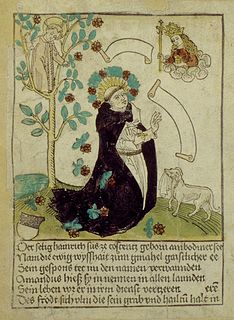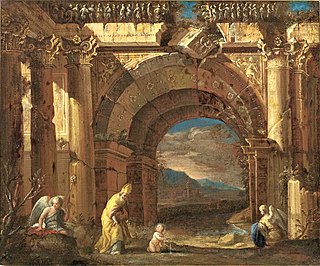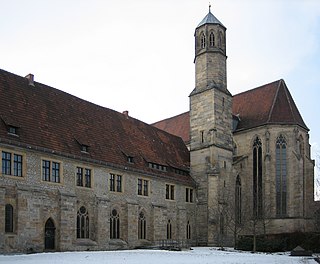Related Research Articles

The Order of Preachers, also known as the Dominicans, is an order of the Catholic Church founded in Toulouse, France, by the Spanish priest Saint Dominic. It was approved by Pope Honorius III via the papal bull Religiosam vitam on 22 December 1216. Members of the order, who are referred to as Dominicans, generally carry the letters OP after their names, standing for Ordinis Praedicatorum, meaning of the Order of Preachers. Membership in the order includes friars, nuns, active sisters, and affiliated lay or secular Dominicans.

Scholasticism was a medieval school of philosophy that employed a critical method of philosophical analysis predicated upon a Latin Catholic theistic curriculum which dominated teaching in the medieval universities in Europe from about 1100 to 1700. It originated within the Christian monastic schools that were the basis of the earliest European universities. The rise of scholasticism was closely associated with these schools that flourished in Italy, France, Spain and England.
Pseudophilosophy is a term applied to a philosophical idea or system which does not meet an expected set of philosophical standards. There is no universally accepted set of standards, but there are similarities and some common ground.

Giles of Rome O.S.A., was a Medieval philosopher and Scholastic theologian and a friar of the Order of St Augustine, who was also appointed to the positions of Prior General of his Order and as Archbishop of Bourges. He is famed as being a logician, producing a commentary on the Organon by Aristotle, and for his authorship of two important works, De Ecclesiastica Potestate, a major text of early 14th century Papalism, and De Regimine Principum, a guide book for Christian temporal leadership. Giles was styled Doctor Fundatissimus by Pope Benedict XIV.

Saint Dominic, also known as Dominic of Osma and Dominic of Caleruega, often called Dominic de Guzmán and Domingo Félix de Guzmán, was a Castilian Catholic priest and founder of the Dominican Order. Dominic is the patron saint of astronomers.

Nicholas Eymerich was a Roman Catholic theologian in Medieval Spain and Inquisitor General of the Inquisition in the Crown of Aragon in the later half of the 14th century. He is best known for authoring the Directorium Inquisitorum, that mostly summarized previous texts and mores.

Johannes Tauler OP was a German mystic, a Roman Catholic priest and a theologian. A disciple of Meister Eckhart, he belonged to the Dominican order. Tauler was known as one of the most important Rhineland mystics. He promoted a certain neo-platonist dimension in the Dominican spirituality of his time.
Theodoric of Freiberg was a German member of the Dominican order and a theologian and physicist. He was named provincial of the Dominican Order in 1293, Albert the Great's old post. He is considered one of the notable philosophers and theologians of the Middle Ages based on his career and writings.

Henry Suso, was a German Dominican friar and the most popular vernacular writer of the fourteenth century. Suso is thought to have been born on 21 March 1295. An important author in both Latin and Middle High German, he is also notable for defending Meister Eckhart's legacy after Eckhart was posthumously condemned for heresy in 1329. He died in Ulm on 25 January 1366, and was beatified by the Catholic Church in 1831.
The Master of Sacred Theology is a graduate-level, North American, academic degree in theology equivalent to ThM. The Roman Catholic equivalent is the Licentiate in Sacred Theology (STL). An honorary title of STM is also awarded within the Dominican Order.
Summa and its diminutive summula was a medieval didactics literary genre written in Latin, born during the 12th century, and popularized in 13th century Europe. In its simplest sense, they might be considered texts that 'sum up' knowledge in a field, such as the compendiums of theology, philosophy and canon law. Their function during the Middle ages was largely as manuals or handbooks of necessary knowledge used by individuals who would not advance their studies any further.

The Friends of God was a medieval mystical group of both ecclesiastical and lay persons within the Catholic Church and a center of German mysticism. It was founded between 1339 and 1343 during the Avignon Papacy of the Western Schism, a time of great turmoil for the Catholic Church. The Friends of God were originally centered in Basel, Switzerland and were also fairly important in Strasbourg and Cologne. Some late-nineteenth century writers made large claims for the movement, seeing it both as influential in fourteenth-century mysticism and as a precursor of the Protestant Reformation. Modern studies of the movement, however, have emphasised the derivative and often second-rate character of its mystical literature, and its limited impact on medieval literature in Germany. Some of the movement's ideas still prefigured the Protestant reformation.
The Brethren of the Free Spirit were adherents of a loose set of beliefs deemed heretical by the Catholic Church but held by some Christians, especially in the Low Countries, Germany, France, Bohemia, and Northern Italy between the thirteenth and fifteenth centuries. The movement was first identified in the late thirteenth century. It was not a single movement or school of thought, and it caused great unease among Church leaders at the time. Adherents were also called Free Spirits.
Remigio dei Girolami (1235–1319) was an Italian Dominican theologian. He was an early pupil of Thomas Aquinas.
The history of Catholic dogmatic theology divides into three main periods: the patristic, the medieval, the modern.

Predigerkirche is a Protestant church in Erfurt, Germany. It is a monastic church to the Dominican friary, Predigerkloster, adjacent to the church. Predigerkirche was originally built by the Dominican Order in the 13th century, when the mystic Meister Eckhart was prior here. The church only became a Protestant church after the Reformation. The original building was modified in 1340–50, and the bell tower was built between 1447 and 1488. Around 1806 Predigerkirche was used as a POW camp, which led to damage to the interior and the equipment. Repairs were made around 1826.

Eckhart von Hochheim, commonly known as Meister Eckhart or Eckehart, was a German Catholic theologian, philosopher and mystic, born near Gotha in the Landgraviate of Thuringia in the Holy Roman Empire.

Medieval philosophy is the philosophy that existed through the Middle Ages, the period roughly extending from the fall of the Western Roman Empire in the 5th century to the Renaissance in the 15th century. Medieval philosophy, understood as a project of independent philosophical inquiry, began in Baghdad, in the middle of the 8th century, and in France, in the itinerant court of Charlemagne, in the last quarter of the 8th century. It is defined partly by the process of rediscovering the ancient culture developed in Greece and Rome during the Classical period, and partly by the need to address theological problems and to integrate sacred doctrine with secular learning.

The Temple Neuf in Strasbourg is a Lutheran church built on the site of the former Dominican convent where Meister Eckhart studied. The Temple was constructed at the end of the 19th century after the old Dominican Church was destroyed during the Siege of Strasbourg on the night of 24 to 25 August, during the Franco-Prussian War. The ensuing fire also destroyed the libraries of the University of Strasbourg and the City of Strasbourg which were located at the Temple Neuf site.
References
- ↑ Nicholas of Strasburg - Catholic Encyclopedia article
- ↑ See Ruedi Imbach, "Metaphysik, Theologie und Politik," in Ruedi Imbach, Quodlibeta (1996).